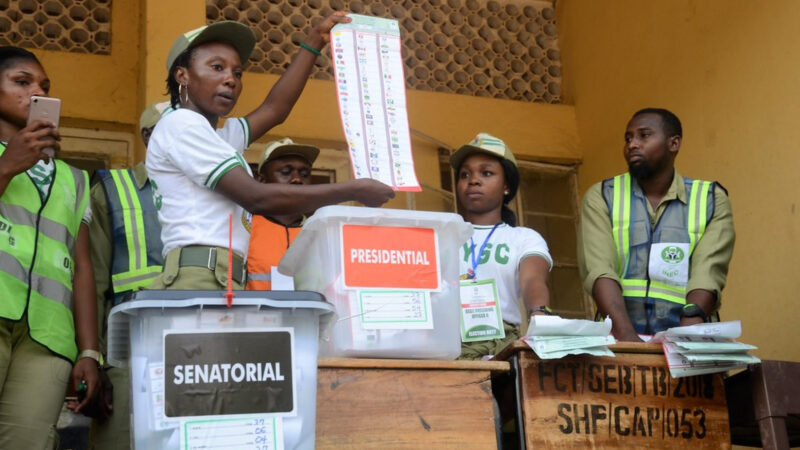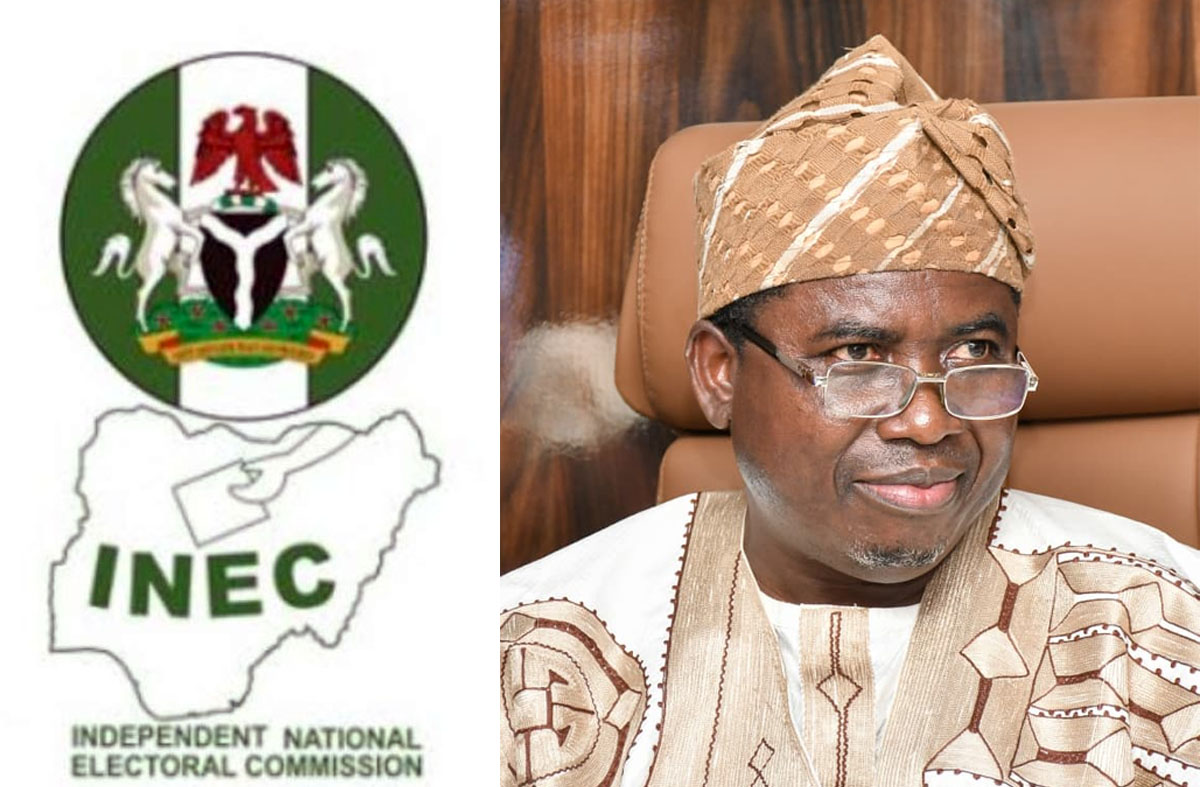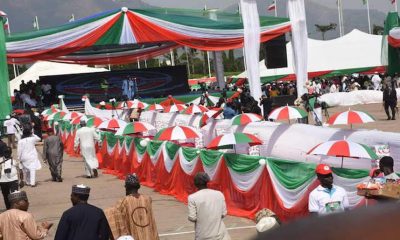News
Appeal court reserves judgment in A’Ibom APC gov suit

The Court of Appeal in Abuja has reserved judgment in an appeal filed by the sacked Akwa Ibom governorship candidate of the All Progressives Congress (APC), Akanimo Udofia, against the judgement of a lower court.
The three-member panel headed by Justice Elfreda Williams-Dawodu made this known after counsel to the appellant, Damian Dodo, SAN, and Sen. Ita Enang’s lawyer, Mba Ukweni, SAN, adopted their briefs and presented their arguments for and against the appeal.
The News Agency of Nigeria (NAN) reports that a Federal High Court (FHC) sitting in Uyo had, on Nov. 14, nullified the nomination of Mr Udofia as the governorship candidate of the APC in Akwa Ibom.
The judge, Agatha Okeke, ordered the APC to conduct a fresh governorship primary within two weeks but barred Udofia from participating in the new primary.
The case was instituted by Mr Enang, a former presidential aide who was an aspirant in the primary.
Enang had prayed the court to declare him the validly elected candidate of the party arguing that Udofia was not a member of the party as at the time of the primary.
But Udofia had filed an appeal marked: CS/C/370/2022 to challenge the FHC judgment.
In the appeal, Enang, APC and Independent National Electoral Commission (INEC) are 1st to 3rd respondents respectively.
Also, in another appeal filed by the APC through its lawyer, J.Y. Musa, SAN, on the same matter marked: CS/C/371/2022, Enang, Udofia and INEC are 1st to 3rd respondents respectively.
Upon resumed hearing in Udofia’s appeal on Saturday, Dodo said the brief which the appellant relied upon was dated December 9 and filed same date.
He adopted all his court documents and urged the court to set aside the judgment of the lower court.
Arguing his case, the lawyer said the lower court erred in its judgment as the suit, which was commenced via an originating summons, ought to have been instituted through a writ of summons, citing an Appeal Court judgment which was affirmed by the Supreme Court on Oct 21 to support his submission.
He said the apex court held that whenever parties are in dispute, especially in pre-election matters, what should be filed was the writ of summons where parties would called their witnesses to enable the court make an unbiased decision since it would be difficult for a court to find two parties agreeing on a fact.
He said in the instant case where there were allegations of results being fabricated, votes being allocated to certain people, Enang (1st respondent) should have commenced the suit by writ of summons.
Dodo also argued that Enang’s amended originating summons was filed at the lower court outside the 14 days period prescribed by law.
According to him, when the lower court predicated its judgment on the amended originating summons, that became an incurable malady that has afflicted the entire suit and the consequence is that the judgment of that court on the basis of the amended originating summons is complete nullity.
Besides, he argued that the brief filed by Enang at Appeal Court was filed out of five-day stipulated time.
He urged the court to uphold their appeal and make a consequential order directing INEC to recognise and publish Udofia (appellant)’s name as APC candidate for 2023 Akwa Ibom governorship poll.
But Ukweni, who appeared for Enang, disagreed with Dodo’s submission.
Responding to the argument that Enang’s brief was filed out of time at Appeal Court since he had within five days to do so, the lawyer said the record of appeal showed that he was served on Dec. 12 in open court in Calabar.
He explained further that though the appellant served them with brief of appeal on Dec. 9, the 1st respondent (Enang) was not served with the record of appeal, including the notice of appeal, until Dec. 12.
He said their brief, dated Dec. 14, was filed on Dec. 16.
“So it is not correct that we filed our brief out of time,” he said, citing a 2006 case decided by Court of Appeal between Justice Party and INEC to back his argument.
Ukweni said in that case, the court held that the respondent’s time to file brief would commence when complete record had been served on parties.
“In fact in this case, all the records in this particular appeal were served on the respondent on the 12th day of December, 2022 in open court,” he insisted.
Reading his brief of argument, the lawyer said that service out of jurisdiction does not apply to FHC when the process is to be served within Nigeria.
He urged the court to dismiss Udofia’s appeal.
Responding to the reply brief of the appellant that Enang’s amended originating summons at FHC was filed outside 14-day period, Ukweni said the trial judge granted their amended originating summon on Aug. 24 in a ruling.
The lawyer argued that the amendment on the originating summons was a decision of the court which was deemed to be properly filed.
He further argued that Udofia should have challenged the court ruling within 14 days from Aug 24 when it was delivered.
“So to now say that they are attacking the judgment on the ground that it was based on amended originating summons is an indirect way of seeking your lordship’s extension of time to appeal against that decision of 24th August, 2022,” he said.
He prayed the court to strike out the issues and the grounds of appeal in this respect.
The senior lawyer, who argued that the decision of the court is sacrosanct, said they cannot come through the back door to challenge it.
Disagreeing with Dodo on filing the lower court suit through originating summons instead of writ of summons, Ukweni said that the Chief Judge of FHC, Justice John Tsoho, gave a practice direction for speedy trial of pre-election cases.
He argued that Justice Tsoho, by the power conferred on him as CJ, directed that pre-election matters should be commenced through originating summons based on the expediency.
“And we commenced the suit by originating summons,” he said.
He clarified that the fact of the case was not the same with the authorities cited by Dodo.
“In that case, there were issues of forgery of certificate but we are not amending forgery of certificate.
“Our argument is that the appellant (Udofia) is a member of PDP who contested its primary election on 25th of May, 2022.
“How come on 26th of May, 2022, you became a candidate of APC?
“That was the simple case that was presented before the lower court and which has come up before your lordship on appeal,” he said.
Ukweni said Udofia admitted before the lower court that he joined APC on May 1.
“The trial judge said assuming we followed your argument that you joined APC on May 1, but the register of members of the party as provided for by the Electoral Act was submitted to INEC on April 14.
“So how could you have passed through the process of nomination even if you have joined a party on May 1st?” he asked.
He told the court that a ballot paper of PDP primary held on May 25 with Udofia’s photograph on it was exhibited in their brief.
The lawyer urged the court to dismiss the appeal, saying it was unmeritorious.
NAN reports that the 2nd (APC) and 3rd (INEC) respondents did not file any brief in the appeal.
Ukweni also prayed the court to dismiss APC’s appeal for being unnecessary, after an appeal had been filed by Udofia.
“Why would you (APC) complained for another person?” he asked, urging the court to dismiss it and affirm the lower court judgment directing the conduct of another election for party members.
Justice Williams-Dawodu, after observing that the case would expire on Jan 22, reserved the matter for judgment.
She said that judgment date would be communicated to parties.
News
INEC May Adjust 2027 Election Dates Over Ramadan Concerns

INEC May Adjust 2027 Election Dates Over Ramadan Concerns
The Independent National Electoral Commission (INEC) has acknowledged growing concerns over the timing of the 2027 general elections, which currently coincide with the holy month of Ramadan, and said it may seek legislative intervention if necessary to ensure full electoral participation.
In a statement released on Friday, INEC National Commissioner and Chairman of the Information and Voter Education Committee, Mohammed Kudu Haruna, said the commission is sensitive to public concerns and is consulting with stakeholders on possible adjustments to the election timetable.
The commission explained that the current schedule, developed in strict compliance with the Constitution of the Federal Republic of Nigeria, 1999 (as amended), the Electoral Act, 2022, and INEC’s own Guidelines and Regulations for the Conduct of Elections, 2022, sets Saturday, February 20, 2027, for the presidential and National Assembly elections, and Saturday, March 6, 2027, for the governorship and State Houses of Assembly elections. Party primaries are slated for May 22 to June 20, 2026.
READ ALSO:
- Man Allegedly Kills Brother in Rivers Over Witchcraft Accusation
- Regina Daniels Gifts Mother Two Luxury SUVs in Emotional Surprise
- El-Rufai Alleges Ribadu Ordered Arrest, Says Intercepted Calls Exposed Plot
However, INEC noted that these dates overlap with Ramadan, a period of fasting, prayer, and religious observances for Muslims, which could affect voter turnout and participation, particularly in predominantly Muslim areas. The commission emphasized that any adjustment to the timetable will remain consistent with constitutional and statutory requirements.
“The commission wishes to assure the public that it remains sensitive to all legitimate concerns that may impact electoral participation and the overall conduct of elections. In view of these representations, INEC is currently undertaking consultations and may, where necessary, seek appropriate legislative intervention,” the statement read.
Several political figures have already expressed concerns. Former Vice President Atiku Abubakar called on INEC to reconsider the February 20 date, citing potential disruption of voting during Ramadan. Former presidential aide Bashir Ahmad also urged the commission to review the schedule to avoid disenfranchisement of Muslim voters.
The commission reaffirmed its commitment to conducting transparent, credible, and inclusive elections. It promised to keep the public informed of any adjustments to the election timetable arising from consultations with political parties, civil society, and religious stakeholders.
The debate over the 2027 election schedule highlights the challenges of balancing constitutional timelines with religious and cultural sensitivities, underscoring the importance of ensuring accessible and fair elections for all Nigerians.
INEC May Adjust 2027 Election Dates Over Ramadan Concerns
News
2027 General Elections: INEC Announces February 20 for Presidential Poll

2027 General Elections: INEC Announces February 20 for Presidential Poll
The Independent National Electoral Commission (INEC) has officially fixed February 20, 2027 for Nigeria’s presidential and National Assembly elections, while governorship and State Houses of Assembly elections will be held on March 6, 2027.
INEC Chairman, Joash Ojo Amupitan, announced the dates on Friday during a media parley at the Commission’s national headquarters in Abuja, describing the move as the formal commencement of the 2027 general elections process.
According to the INEC chairman, the release of the Notice of Election and the comprehensive timetable complies with provisions of the 1999 Constitution of Nigeria and the Electoral Act 2022, which require the Commission to publish election notices ahead of the polls.
“It is with a deep sense of constitutional responsibility and commitment to democratic consolidation that the Commission today formally releases the Notice of Election and the Timetable and Schedule of Activities for the 2027 General Elections,” he stated, adding that any earlier unofficial announcements of election dates were misleading and did not originate from INEC.
READ ALSO:
- EFCC Nabs Three in Borno Over Viral ₦500 Naira Mutilation Video
- Omokri Accuses El-Rufai of Rights Abuses During Kaduna Governorship
- Lagos Motor Fair, Autoparts Expo to begin March 17, targeting Investment, Industry Growth
Amupitan disclosed that the tenure of the President, Vice President, governors, and deputy governors — except in off-cycle states — will expire on May 28, 2027, while the National and State Assemblies will be dissolved on June 8, 2027. He noted that the timeline provides sufficient room for political parties to conduct primaries, submit nomination forms, and organise campaigns in line with electoral regulations. Campaigns, he added, must end 24 hours before election day, as stipulated by law.
The INEC boss warned political parties to strictly comply with the approved schedule, stressing that the Commission would enforce the law where necessary. “Political parties are strongly advised to strictly adhere to the timelines. The Commission will not hesitate to enforce compliance with the law,” he said.
He also reaffirmed INEC’s commitment to deploying technology to enhance transparency in the 2027 general elections, updating the national voters’ register, strengthening collaboration with security agencies, and expanding voter education nationwide.
Calling for peaceful conduct, Amupitan urged political parties to organise credible primaries, shun violence and inflammatory rhetoric, and uphold internal democracy. He also appealed to candidates, supporters, civil society groups, the media, and citizens to play constructive roles throughout the electoral cycle.
“As we commence this national exercise, I assure Nigerians that the Commission is fully prepared and determined to deliver elections that reflect the sovereign will of the people,” he added.
With the formal release of the INEC 2027 election timetable, stakeholders are now expected to begin full-scale preparations for Nigeria’s next general elections.
2027 General Elections: INEC Announces February 20 for Presidential Poll
News
INEC Seeks N1.04 Trillion for 2027 Elections, Operational Needs – Amupitan

INEC Seeks N1.04 Trillion for 2027 Elections, Operational Needs – Amupitan
The Independent National Electoral Commission (INEC) has requested a total of ₦1.04 trillion from the Federal Government of Nigeria to fund off-cycle elections this year, the 2027 general election, and its operational activities in 2026, subject to approval by the National Assembly of Nigeria.
The request was made by INEC Chairman Prof. Joash Amupitan while defending the commission’s spending proposal before the Joint Committee on Electoral Matters of the National Assembly. Amupitan urged lawmakers to grant timely approval and release of funds, warning that delays could hamper preparations for upcoming elections.
According to the INEC chairman, the commission is seeking ₦873.778 billion for the 2027 general election and ₦171 billion for its 2026 operational activities. The 2026 allocation covers Federal Capital Territory (FCT) area council elections, by-elections scheduled for next week, and the Ekiti and Osun governorship elections slated for June and September.
READ ALSO:
- Alake: Killers of Mining Marshal Will Face Full Wrath of the Law
- Lagos Police Launch Manhunt for Suspect in Brutal Ajah Murder
- Lookman Shines as Atlético Madrid Hammer Barcelona 4-0
Breakdown of the 2027 Election Budget
The N873.778 billion earmarked for the 2027 general election includes:
- ₦379.748 billion for operational costs
- ₦92.317 billion for administrative expenses
- ₦209.206 billion for technology
- ₦154.905 billion for election capital costs
- ₦42.608 billion for miscellaneous expenses
For the N171 billion proposed for 2026 operations, Amupitan said:
- ₦109 billion would cover personnel costs
- ₦18.7 billion for overheads
- ₦42.63 billion for election conduct
- ₦1.4 billion for capital expenditure
He noted that the budget was prepared in line with Section 3(3) of the Electoral Act 2022, which mandates submission of election budgets at least one year before a general election.
Calls for Timely Fund Release and Dedicated Network
Amupitan criticized the envelope system of budgeting, describing it as unsuitable for INEC’s operational needs that often require urgent interventions. He appealed for a bulk release of funds, highlighting the need for a dedicated communication network to enhance accountability and transparency during elections.
“If we have our own network, Nigerians can hold us responsible for any hitch,” he said.
Lawmakers Back INEC’s Proposal
Senator Adams Oshiomhole argued that no government agency should impose the envelope budgeting system on INEC, emphasizing that full release of funds is critical for smooth election preparations. Similarly, House member Billy Osawaru called for the budget to be placed on first-line charge, allowing the commission access to all funds immediately.
Following deliberations, the joint committee approved a one-time release of INEC’s annual budget and pledged to consider increasing allowances for National Youth Service Corps (NYSC) members deployed for election duties. The proposed increase would cost ₦32 billion, equating to ₦125,000 per corps member.
Senator Simon Lalong, chairman of the Senate Committee on Electoral Matters, assured INEC of lawmakers’ support, pledging close collaboration to ensure a successful 2027 election. House Committee chairman Bayo Balogun also promised legislative backing but cautioned INEC against overpromising, citing prior misrepresentations about real-time uploads to the INEC Result Viewing (IReV) portal, which was never provided for in the Electoral Act but only in INEC regulations.
The approval of the commission’s budget and operational requests is expected to enhance election preparedness, technological deployment, and transparency ahead of the 2027 general elections, while addressing logistical and operational challenges that have hampered past polls.
INEC Seeks N1.04 Trillion for 2027 Elections, Operational Needs – Amupitan
-

 metro2 days ago
metro2 days agoIKEDC Sets Feb 20 Deadline for Customers to Submit Valid IDs or Face Disconnection
-

 Education2 days ago
Education2 days agoSupreme Court Affirms Muslim Students’ Right to Worship at Rivers State University
-

 metro2 days ago
metro2 days agoLagos Police Launch Manhunt for Suspect in Brutal Ajah Murder
-

 News2 days ago
News2 days agoAso Rock Goes Solar as Tinubu Orders National Grid Disconnection
-

 Business2 days ago
Business2 days agoNaira Could Trade Below ₦1,000/$ With Dangote Refinery at Full Capacity — Otedola
-

 metro2 days ago
metro2 days agoArmy University Professor Dies in Boko Haram Captivity After Nearly One Year
-

 International2 days ago
International2 days agoTrump Halts Minnesota Immigration Crackdown After Fatal Shootings, Protests
-

 Politics3 days ago
Politics3 days agoCity Boy Movement Receives Bus Donations from Zenco, Obi Cubana for Tinubu’s Campaign















